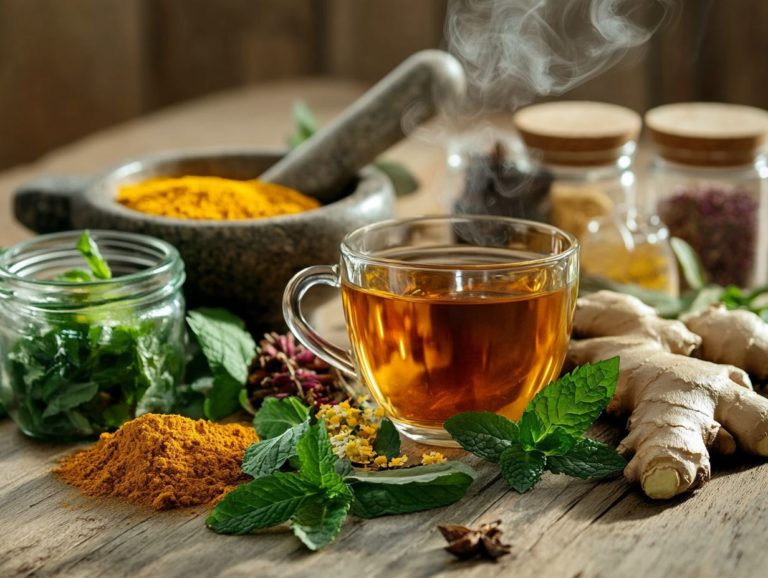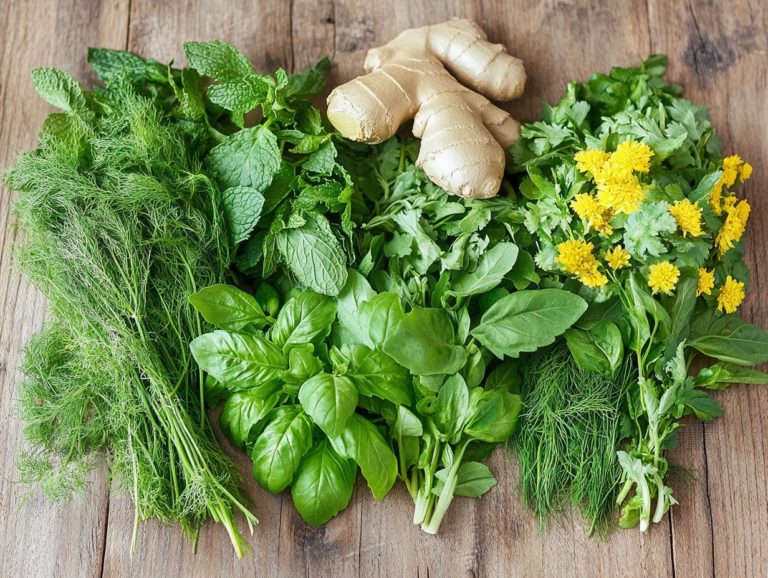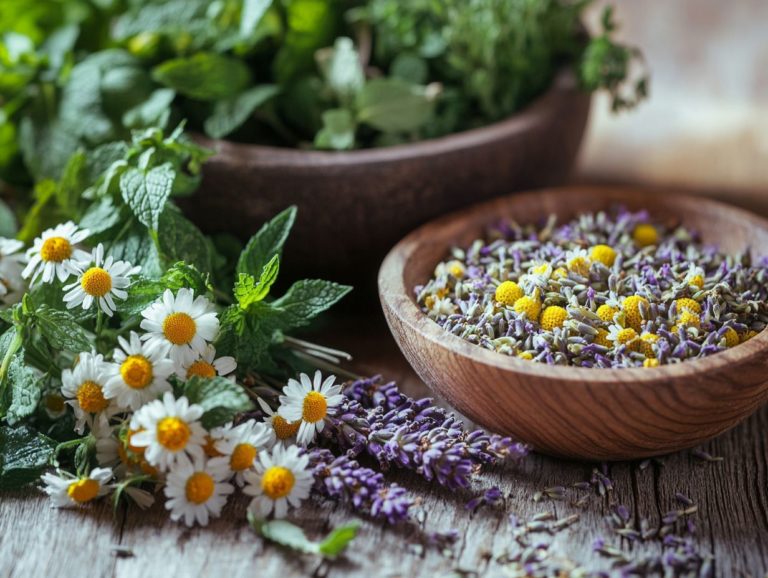Herbs for Treating Digestive Discomfort
Digestive discomfort can be an annoying issue that many face, often leaving you on the lookout for relief.
Fortunately, nature offers a wealth of herbs renowned for their soothing properties.
This article explores five common herbs peppermint, ginger, chamomile, fennel, and turmeric that can help ease your digestive troubles.
Learn how to easily add these herbs to your daily life, including methods of consumption and suggested dosages, while also noting essential precautions to consider.
Discover how these natural remedies, including herbal medicine and dietary supplements, can restore comfort and balance to your life!
Contents
- Key Takeaways About Herbs for Digestive Health:
- What Causes Digestive Discomfort?
- Common Herbs for Treating Digestive Discomfort
- How to Use Herbs for Digestive Discomfort
- Precautions and Potential Interactions
- Frequently Asked Questions
- What are some common herbs used for treating digestive discomfort?
- How do peppermint and ginger help with digestive discomfort?
- Are there any potential side effects of using herbs for treating digestive discomfort?
- Can herbs be used as a long-term solution for digestive discomfort?
- What is the best way to consume herbs for treating digestive discomfort?
- Are there any herbs that should be avoided for treating digestive discomfort?
Key Takeaways About Herbs for Digestive Health:
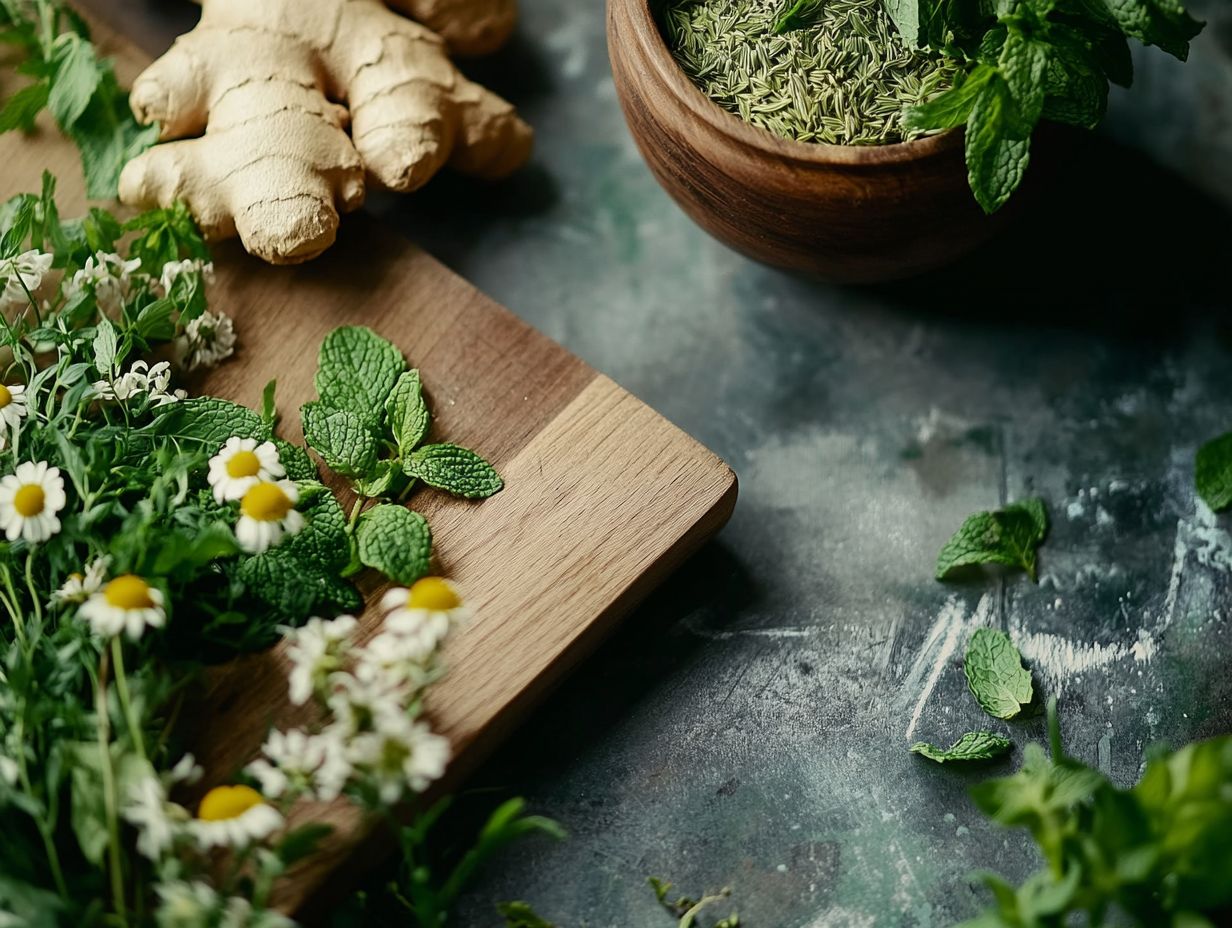
- Peppermint, ginger, chamomile, fennel, and turmeric are effective herbs for treating digestive issues due to their anti-inflammatory and calming properties.
- These herbs can be consumed in various forms such as tea, capsules, or as seasoning in food, with recommended dosages varying based on symptom severity.
- Consult a healthcare professional before incorporating these herbs into your treatment plan, especially if you are taking medications or have underlying health conditions.
What Causes Digestive Discomfort?
Digestive discomfort can stem from a range of underlying conditions, including celiac disease, inflammatory bowel disease (IBD), and irritable bowel syndrome (IBS). These conditions can cause inflammation in the gut, leading to symptoms like abdominal pain, bloating, and irregular bowel movements.
Factors such as diet, stress, and genetics can significantly aggravate these issues. Understanding the root causes is essential for effectively managing and alleviating discomfort, paving the way for appropriate treatments and herbal treatments for anxiety relief that can restore balance to your digestive health.
Common Herbs for Treating Digestive Discomfort
Herbs have long been a cornerstone of traditional medicine systems, like Ayurveda and Traditional Chinese Medicine, skillfully employed to alleviate digestive discomfort. These natural remedies not only promise relief but also enhance overall digestive health.
Among the most revered are peppermint, ginger root, which is often recommended for its anti-inflammatory properties that help alleviate symptoms associated with gastrointestinal inflammation, chamomile, fennel, and turmeric. Each of these herbs brings its own unique health benefits and anti-inflammatory properties, working in harmony to support your digestive tract and soothe symptoms associated with gastrointestinal inflammation. For more insights, explore 5 herbs that support healthy digestion.
Peppermint
Peppermint is celebrated for its remarkable digestive health benefits.
Peppermint oil is an effective remedy for alleviating symptoms like bloating and abdominal pain.
This essential oil works through several mechanisms, most notably its ability to reduce muscle spasms that help relax the muscles of your gastrointestinal tract, offering relief from cramps and spasms. Peppermint oil also enhances bile flow, aiding in fat digestion and boosting overall nutrient absorption. Incorporating popular herbs for healthy digestion can further support your digestive health.
For optimal results, recommended dosages typically range from 0.2 to 0.4 milliliters, taken two to three times daily. However, it s wise to consult with a healthcare provider to receive tailored advice that suits your needs.
While peppermint oil boasts many advantages, some individuals may encounter side effects, such as heartburn or allergic reactions. Nevertheless, many experience significant relief from digestive discomfort through the use of peppermint oil.
Try these herbs today and feel the difference in your digestive health!
Ginger
Ginger, especially in its root form, is celebrated for its remarkable ability to combat stomach inflammation and enhance digestive function. This reputation stems from its active component, gingerol, which has been extensively studied for its anti-inflammatory and antioxidant properties.
Incorporating ginger into your daily routine can be incredibly beneficial. Whether it s through a soothing cup of ginger tea or a convenient dietary supplement, many people find it makes a noticeable difference.
To truly harness its digestive health benefits, a commonly recommended dosage is around 1 to 2 grams of fresh ginger per day, or the equivalent in supplements. It’s essential to consult with a healthcare provider, especially if you re taking blood thinners or medications for diabetes, to avoid potential interactions.
By understanding these key aspects, you can naturally elevate your digestive wellness.
Chamomile
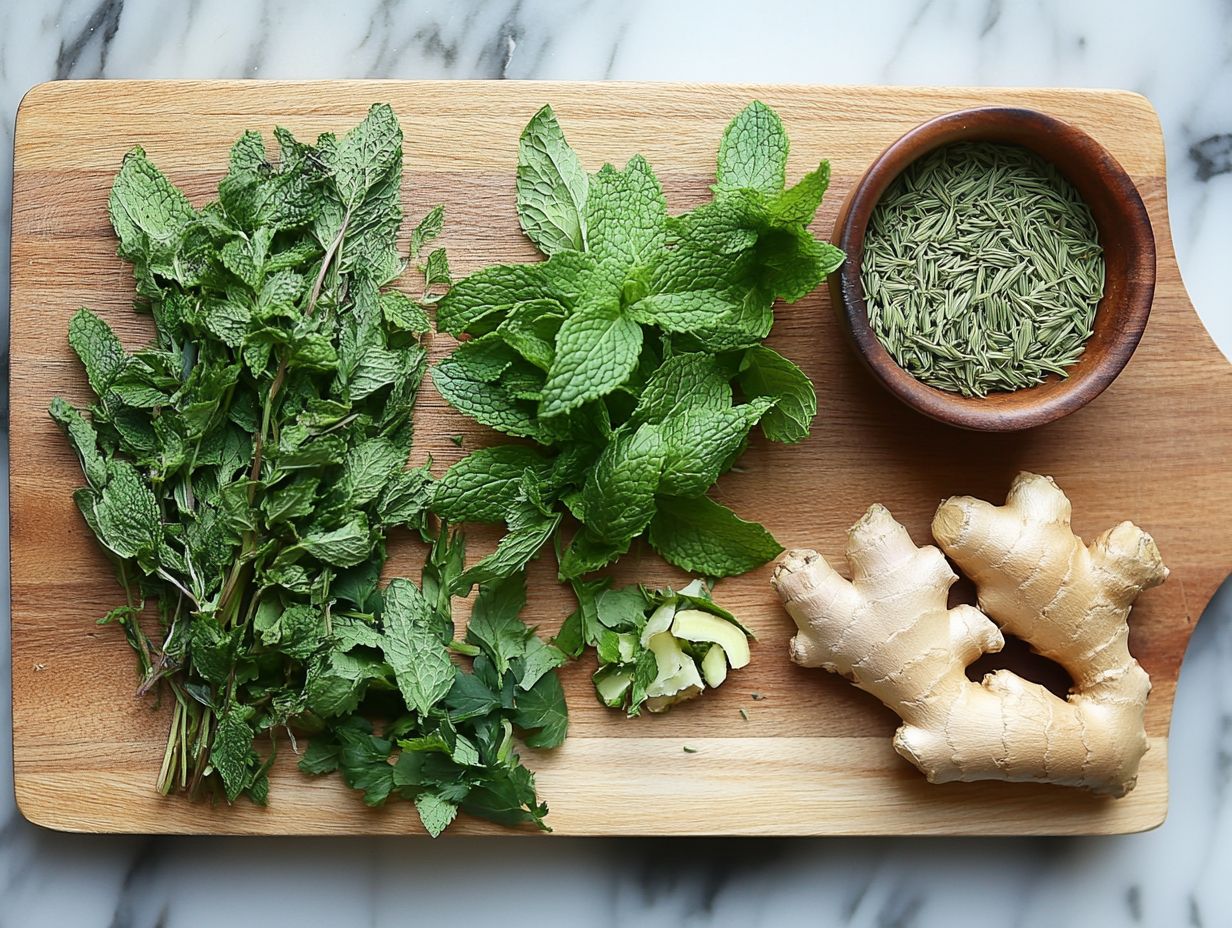
Chamomile is a renowned herbal remedy known for its soothing effects on the digestive system and its ability to reduce inflammation. This gentle flower works wonders when brewed into a calming tea, offering relief from discomfort associated with indigestion, bloating, and gas.
To prepare chamomile tea, steep the dried flowers in hot water for about 5 to 10 minutes, allowing the beneficial compounds to meld beautifully. For the best results, aim for one to two cups a day.
It’s essential to consult with a healthcare professional, especially if you’re pregnant, nursing, or taking certain medications, as chamomile may interact with blood thinners and sedatives. This herbal infusion not only calms your body but also enhances overall digestive health, and considering herbal remedies for relieving constipation can be beneficial as well.
Fennel
Fennel is a versatile herb that you can seamlessly integrate into your cooking, renowned not just for its culinary flair but also as a digestive ally, alleviating gas and bloating.
This aromatic plant, with its unique flavor profile, elevates a wide range of dishes from crisp salads to hearty roasts while offering a host of health benefits that support your gastrointestinal well-being. Packed with antioxidants and active compounds like anethole and fiber, fennel can enhance digestive health and help ease discomfort after meals, as well as provide herbs for relieving stress-induced tension.
If you re looking to incorporate fennel into your diet, it’s simple add it to your recipes or brew it into a calming tea. Just keep in mind that while it s generally safe, overindulgence may lead to side effects like allergic reactions or hormonal imbalances, especially for those with specific medical conditions.
Turmeric
Turmeric, with its active compound curcumin, stands out as a powerful herb renowned for its anti-inflammatory properties, making it an excellent ally for your digestive health.
This extraordinary spice promotes healthy digestion and plays a vital role in reducing inflammation throughout your body. This can be especially beneficial if you’re grappling with chronic pain or arthritis. Don’t miss out on the chance to add turmeric to your meals today; consider incorporating it into smoothies, soups, or indulging in a warm cup of golden milk. For even more benefits, explore the 5 best herbs for digestive health that can complement your diet.
To maximize its effectiveness, experts typically recommend a daily dosage of 500 to 2,000 milligrams of curcumin, ideally paired with black pepper to boost absorption. By understanding these methods, you can fully harness the health advantages that turmeric offers.
How to Use Herbs for Digestive Discomfort
Harnessing the power of herbs for digestive discomfort can be both effective and straightforward, provided you understand the different methods of consumption and the recommended dosages.
By doing so, you can unlock the maximum benefits these natural remedies have to offer.
Methods of Consumption
To ease digestive discomfort, you have several common methods: teas, capsules, and tinctures. Each method offers distinct advantages and conveniences.
Teas are often a favorite choice, celebrated for their soothing warmth and straightforward preparation. Just boil some water and steep the herbs. This method also lets you customize the flavor, adding a personal touch to your experience.
If you re on the go, capsules offer a more straightforward, no-nonsense option. However, it s crucial to select those that are easily absorbed for maximum effectiveness.
Tinctures, with their strong herbal extracts, can be effortlessly added to your drinks, although their alcohol content might not appeal to everyone.
Explore these consumption methods to find the best fit for your lifestyle and personal preferences, and consider trying DIY herbal remedies for digestive health to ensure you find effective relief from digestive issues.
Recommended Dosages
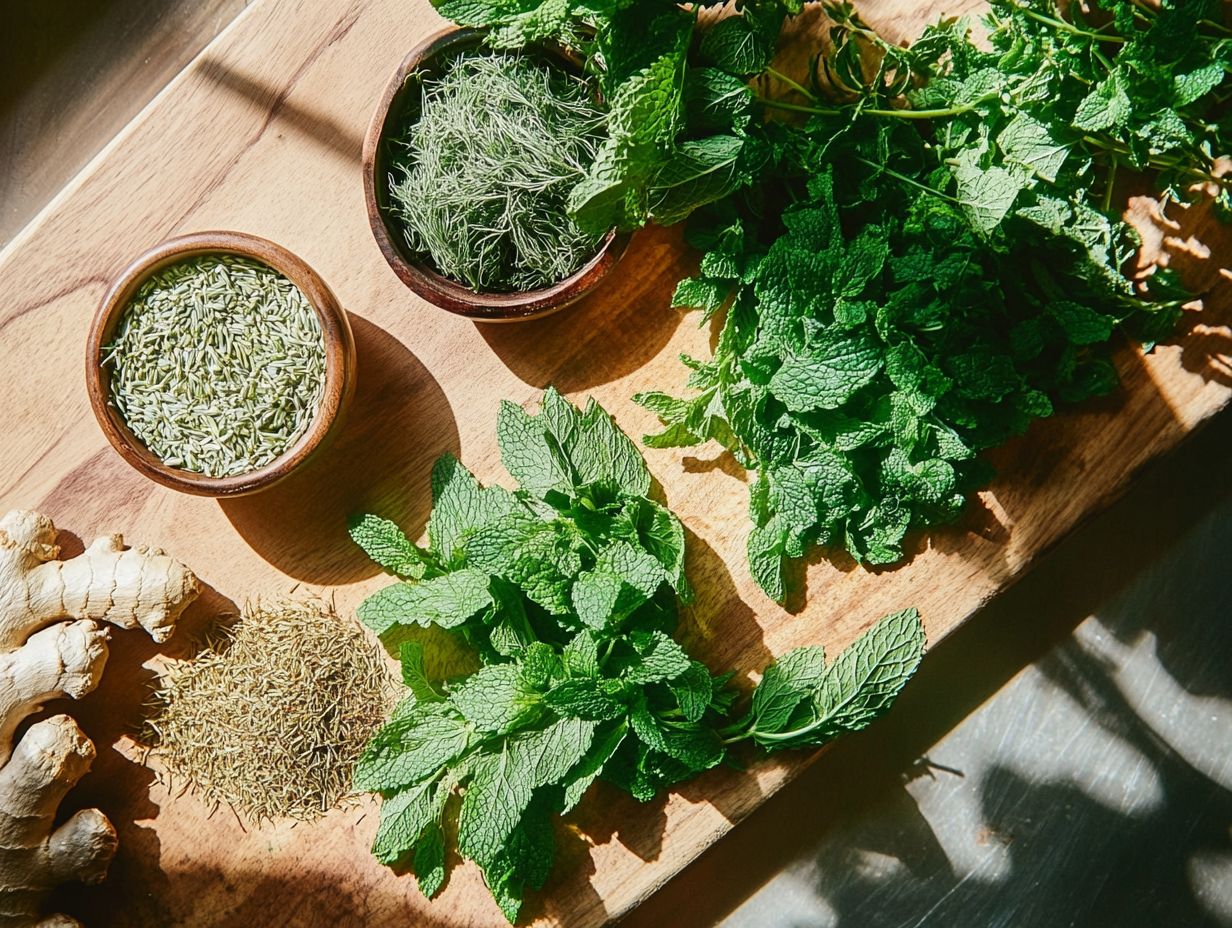
Determining the right dosages for herbs aimed at alleviating digestive discomfort is essential for both efficacy and safety. Excessive consumption can lead to unwanted side effects that you definitely want to avoid.
Each herb comes with varying suggested dosages, influenced by individual factors like your age, body weight, and overall health conditions. For example, peppermint tea is typically recommended at a dosage of 1-2 cups daily, while ginger root may be effective at around 1-2 grams when dried. Keep in mind that these amounts can shift significantly based on specific health circumstances, such as pregnancy or existing medical issues. For those looking for more targeted approaches, exploring herbal solutions for IBS management can be beneficial.
Don’t overlook these factors! Tailoring your herbal approach can make all the difference in your health. Consulting a healthcare professional is highly advisable to ensure that the herbs you choose are suitable, effective, and safe for your unique situation, especially when considering herbs for treating gastritis naturally.
Precautions and Potential Interactions
While herbs can offer remarkable relief for digestive discomfort, it’s crucial to remain mindful of the necessary precautions and possible interactions with your medications.
Consulting with a Healthcare Professional
Before incorporating herbal medicine into your routine, consulting with a healthcare professional is essential. This ensures you receive personalized advice tailored to your specific health needs.
As you embark on this journey, consider the qualifications and experience of your chosen practitioner. Ask relevant questions that can help clarify the process, such as their familiarity with particular herbal remedies and any potential interactions with your current medications.
This open dialogue fosters understanding and enables you to make informed decisions. Discussing previous experiences, dosage guidelines, and possible side effects enhances the safety of using herbal solutions, ultimately promoting a harmonious balance between traditional healthcare and natural remedies.
Frequently Asked Questions
What are some common herbs used for treating digestive discomfort?
Some common herbs used for treating digestive discomfort include peppermint, ginger, fennel, chamomile, and licorice.
How do peppermint and ginger help with digestive discomfort?
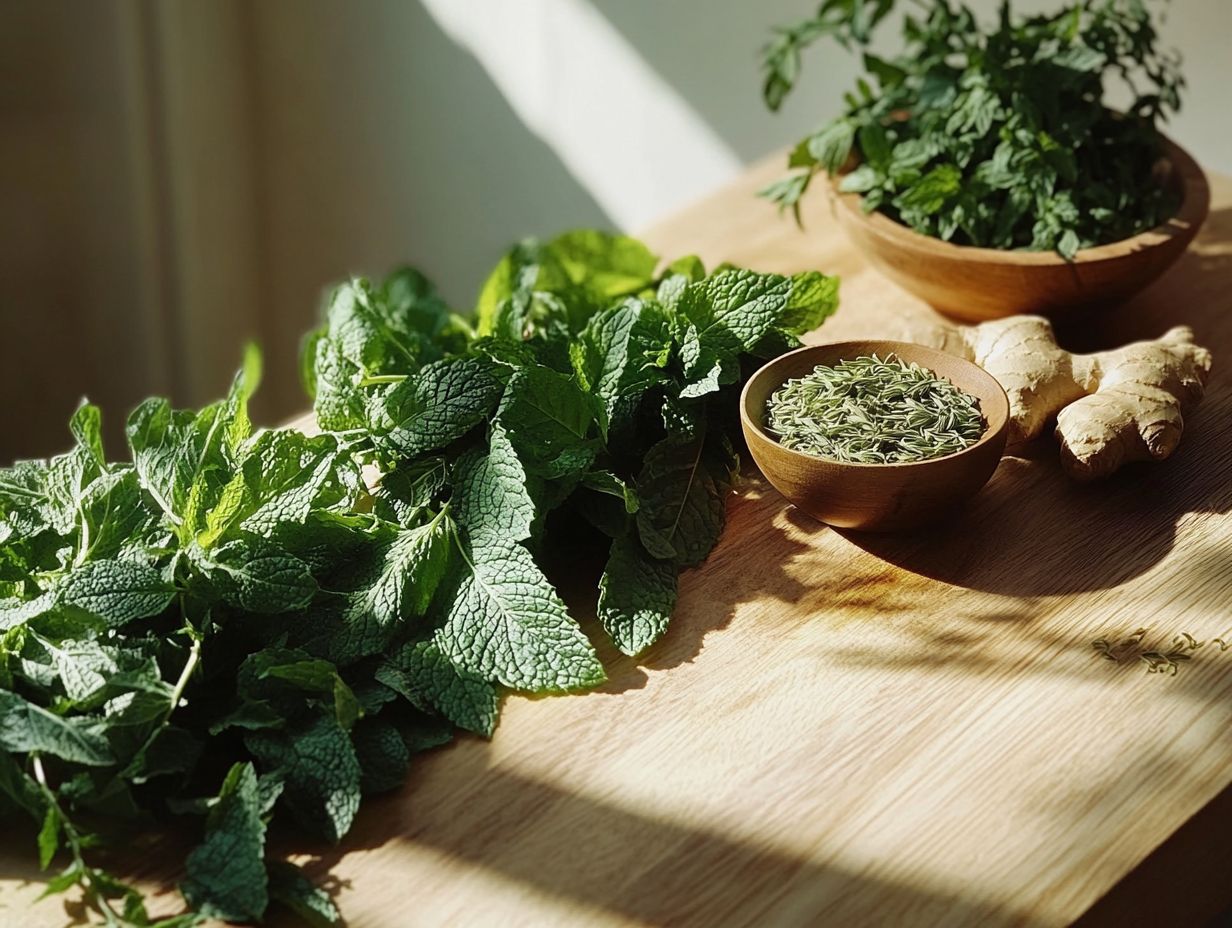
Peppermint has been found to relax the muscles in the digestive tract, which can help alleviate cramping and bloating. Ginger has anti-inflammatory properties that can reduce inflammation in the stomach and intestines, easing symptoms of digestive discomfort.
Are there any potential side effects of using herbs for treating digestive discomfort?
While herbs are generally safe, there can be potential side effects for some people. For example, peppermint may worsen symptoms for those with acid reflux, and fennel can interact with certain medications. It’s always best to consult with a healthcare professional before using herbs for digestive discomfort.
Can herbs be used as a long-term solution for digestive discomfort?
Herbs can be a valuable part of your long-term strategy for easing digestive discomfort. It’s crucial to also identify the root cause and make changes in daily habits.
What is the best way to consume herbs for treating digestive discomfort?
You can enjoy herbs in many ways, including teas, tinctures, and capsules. Always stick to recommended dosages and chat with a healthcare professional for the best guidance.
Are there any herbs that should be avoided for treating digestive discomfort?
Some herbs can actually do more harm than good. For instance, cascara sagrada may lead to dependency and harm your colon, while comfrey can be toxic to your liver. Always research thoroughly and consult a healthcare professional before trying new herbs.


